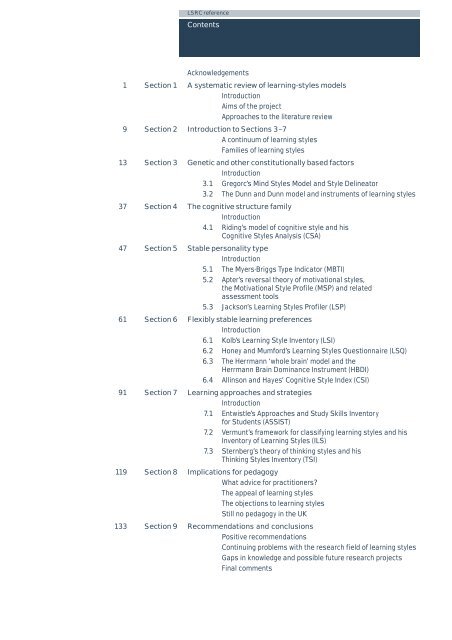learning-styles
learning-styles
learning-styles
You also want an ePaper? Increase the reach of your titles
YUMPU automatically turns print PDFs into web optimized ePapers that Google loves.
LSRC reference<br />
Contents<br />
1<br />
9<br />
13<br />
37<br />
47<br />
61<br />
91<br />
119<br />
133<br />
Section 1<br />
Section 2<br />
Section 3<br />
Section 4<br />
Section 5<br />
Section 6<br />
Section 7<br />
Section 8<br />
Section 9<br />
Acknowledgements<br />
A systematic review of <strong>learning</strong>-<strong>styles</strong> models<br />
Introduction<br />
Aims of the project<br />
Approaches to the literature review<br />
Introduction to Sections 3–7<br />
A continuum of <strong>learning</strong> <strong>styles</strong><br />
Families of <strong>learning</strong> <strong>styles</strong><br />
Genetic and other constitutionally based factors<br />
Introduction<br />
3.1 Gregorc’s Mind Styles Model and Style Delineator<br />
3.2 The Dunn and Dunn model and instruments of <strong>learning</strong> <strong>styles</strong><br />
The cognitive structure family<br />
Introduction<br />
4.1 Riding’s model of cognitive style and his<br />
Cognitive Styles Analysis (CSA)<br />
Stable personality type<br />
Introduction<br />
5.1 The Myers-Briggs Type Indicator (MBTI)<br />
5.2 Apter’s reversal theory of motivational <strong>styles</strong>,<br />
the Motivational Style Profile (MSP) and related<br />
assessment tools<br />
5.3 Jackson’s Learning Styles Profiler (LSP)<br />
Flexibly stable <strong>learning</strong> preferences<br />
Introduction<br />
6.1 Kolb’s Learning Style Inventory (LSI)<br />
6.2 Honey and Mumford’s Learning Styles Questionnaire (LSQ)<br />
6.3 The Herrmann ‘whole brain’ model and the<br />
Herrmann Brain Dominance Instrument (HBDI)<br />
6.4 Allinson and Hayes’ Cognitive Style Index (CSI)<br />
Learning approaches and strategies<br />
Introduction<br />
7.1 Entwistle’s Approaches and Study Skills Inventory<br />
for Students (ASSIST)<br />
7.2 Ver munt’s framework for classifying <strong>learning</strong> <strong>styles</strong> and his<br />
Inventory of Learning Styles (ILS)<br />
7.3 Sternberg’s theory of thinking <strong>styles</strong> and his<br />
Thinking Styles Inventory (TSI)<br />
Implications for pedagogy<br />
What advice for practitioners?<br />
The appeal of <strong>learning</strong> <strong>styles</strong><br />
The objections to <strong>learning</strong> <strong>styles</strong><br />
Still no pedagogy in the UK<br />
Recommendations and conclusions<br />
Positive recommendations<br />
Continuing problems with the research field of <strong>learning</strong> <strong>styles</strong><br />
Gaps in knowledge and possible future research projects<br />
Final comments


